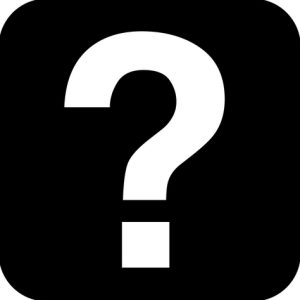Children are known for asking questions. Actually, they tend to ask one question over and over again. Why? (I don’t mean why do they ask the same question, I mean the question is “why?”)
 Why do ants live in the ground?
Why do ants live in the ground?
Why can’t we go see a live dinosaur?
Why do I have to go to bed?
Why is the sky blue?
Actually that was a good one. I answered it by saying, “Great question! Let’s see if we can figure it out.”
As we grow older we morph somehow from “I have a question” to “I have the answer.” Often we don’t seem to care if there is a question. We have an answer and it must be given.
Ask yourself this question: Am I still asking questions? I hope your answer is yes. Here is a quote that will encourage you to do more of that.
The wise man doesn’t give the right answers, he poses the right questions.
The author of that quote was Claude Lévi-Strauss, a French anthropologist who did not make blue jeans. (That was Levi Strauss, a German immigrant.) Claude lived for almost 101 years, gaining wisdom along the way. I know that because his third marriage lasted more than 50 years.
Do we even ask the question?
In today’s America we seem to have a penchant for giving answers. Just around COVID we hear: “Wear a mask.” “Get vaccinated.” “Stay  home.” One reason people have protested that advice is the same reason children protest going to bed: no one is saying why.
home.” One reason people have protested that advice is the same reason children protest going to bed: no one is saying why.
The directives are clear, but the questions are not. Parents and bosses and government officials are allowed to give directives. I’m OK with that, but I still think it is wise to ask the right questions first.
Back in the spring of 2020 schools were shut down. I saw a young friend who teaches fifth grade, and I asked her how she was doing. She was sad to be away from her students, she said, and they were sad to be away from each other.
I asked her this question: “Would you purposely do something to your students that you knew would hurt them in order to possibly protect them from something that might hurt them in the unlikely case they came into contact with it?”
Although it was a long question, it took her only seconds to grasp it. She said, “I’ve never thought of it like that.” And she was not alone.
I don’t know if my question was ever asked by those in charge of schools, but I saw little evidence in most places that it was. What I saw being asked were what are sometimes called CYA questions. Those are often asked by leaders who are in protection mode, and there is plenty of that to be found in both government and business.
Just to be clear, I’m occasionally in favor of erring on the side of caution. But I’m always in favor of asking the right questions.
A very important question for you and your business
Here’s a question I heard for the first time last Friday. It has broad application, but it was asked in the context of the pandemic. Two friends were having lunch and discussing what a challenging test the pandemic had been.
Then one of them asked, “What if that was the lesson and this is the test?”
That, to be sure, is a great question. What if COVID-19 was a lesson for us and not a test of us? What if how we act now is the test?
The more I ponder that possibility the more it resonates with me. Partly that’s because it squares with the way God has worked in history. Take Job, for instance. He was a good man who loved God. God also loved him and held him in high esteem. But Job still had things to learn, so God, knowing he could handle it, taught Job a lesson.
God didn’t need to test Job, because he knew Job could pass any test the devil could throw at him. But he did need to teach Job a lesson. So he did, using Satan’s test to grow Job and defeat Satan in one fell swoop. God’s test for Job would be how he lived after it all.
That, I believe, is our test as well. We have been very good to each other during the pandemic. This web site alone is littered with stories about people doing good for their fellow human beings. I’m sure you have your own.
Where are those stories now? Do you notice people caring more? Have you seen greater patience in people? Are we more reverent? Are we more humble? Now that we have witnessed the ability of a tiny little virus to wreak havoc, do we still think we’re all that?
How should we then live?
 Back in the mid-1970’s, Francis Schaeffer published a book called How Should We Then Live? I happened to meet Dr. Schaeffer very briefly one afternoon following a lecture he had given in St. Louis, so I was compelled to buy the book. Just now I picked it up again, and his title question is every bit as relevant today as it was more than 40 years ago.
Back in the mid-1970’s, Francis Schaeffer published a book called How Should We Then Live? I happened to meet Dr. Schaeffer very briefly one afternoon following a lecture he had given in St. Louis, so I was compelled to buy the book. Just now I picked it up again, and his title question is every bit as relevant today as it was more than 40 years ago.
What questions can you ask that will bring meaning to your work and life? Let me suggest you begin with the two above. First: What if that was the lesson and this is the test? Look at your life and experiences from that perspective and see what changes.
Second: How should we then live? Looking back over history and understanding why civilizations, companies and people failed, how should we live? Should we live like they did, or should we find a better way?
Let’s return to our childlike way of asking questions, and let’s make sure we are asking the right questions.
One of those might well be: How can I do good every day?
Do good. It’s in you.

2 Responses
Interesting enough… I now have more questions than answers….
Thanks Lewis!
You are welcome, Dave, and good for you!
Is it possible that having more questions than answers is one true measure of growth? As Socrates said, “I know that I am intelligent, because I know that I know nothing.”